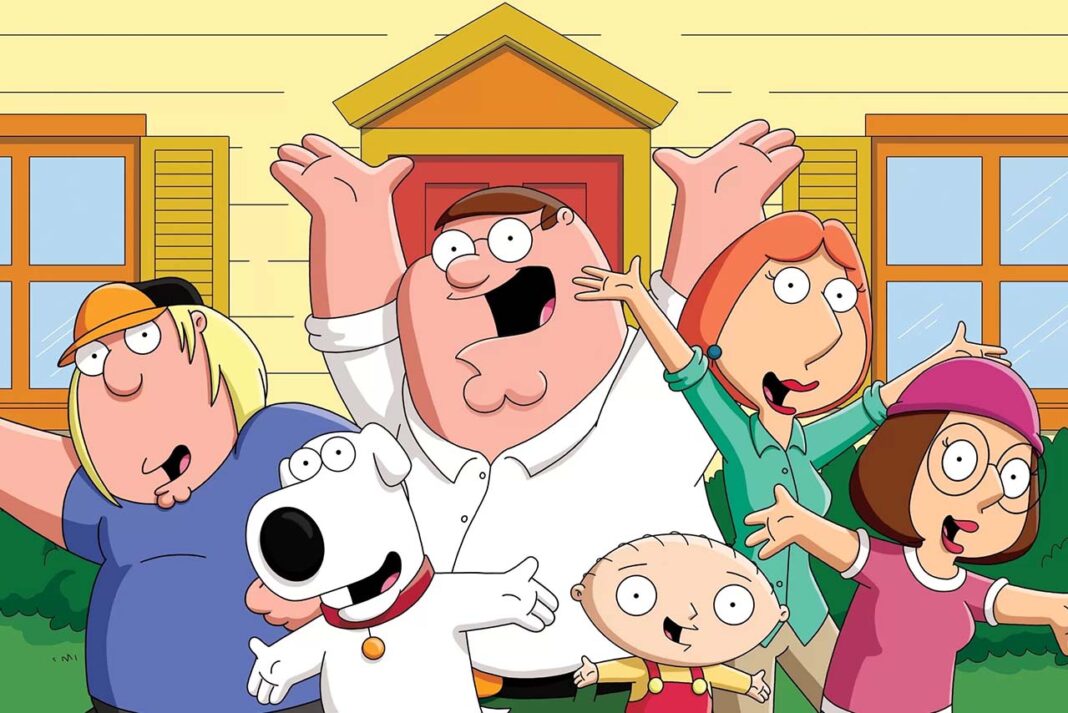Seth MacFarlane’s Family Guy series is an animated sitcom for adults, running for 24 seasons since 1999. It follows the daily adventures of the Griffins, a classic family living in the fictional town of Quahog, Rhode Island. The show also features humorous stories featuring many of the town’s characters.
With its dark humor, often known as a dark comedy, this show pushes boundaries and makes jokes about everything, revealing even the deepest depths of the psyche. The pleasures we bury in the darkest recesses of our subconscious can emerge through humor in this show.
What is Family Guy, which has faced much criticism for this style, trying to tell us? If this is what disturbs us so much in our subconscious?
Perhaps we simply don’t like to encounter what lies buried in our subconscious.
The Griffin Family
The Griffin family, consisting of a mother, father, three children, and a dog, live an ordinary life in their Quahog home.
-
Peter Griffin: He is the father of the Griffin family, but his character is the exact opposite of a father figure. He is childish, irresponsible, and impulsive. He is often portrayed as selfish. He also frequently engages in excessive alcohol consumption and violent behavior in the show.
-
Louis Griffin: As the mother of the family, he takes responsibility for everything and runs the household. Although he is normally from an upper-class background, his life changes drastically after marrying Peter. Although he is the most normal and stable character on the show, we sometimes witness his moral collapses and the emergence of repressed desires.
-
Meg Griffin: He is the eldest child in the family. While generally appearing normal, he is an outcast both in the family and at school. He is constantly teased and belittled. He constantly searches for love, but is always unsuccessful.
-
Chris Griffin: The middle son of the family, Chris is often similar to Peter. His childish traits and impulsive behavior often get him into trouble.
-
Stewie Griffin: Stewie, normally a baby, possesses extraordinary intelligence. He harbors a grudge against his family, plots to destroy the world, and constantly invents new things.
-
Brian Griffin: Brian, the Griffin family’s talking dog, is also the most intellectual character in the family. His biggest dream is to become a writer, but he’s constantly melancholic and suffering from existential angst.
Humor and Psychoanalysis
According to Freud, concepts like humor not only have a social function but also serve an individual purpose. Expressing repressed feelings through humor allows the release of these repressed feelings and a reduction in tension. Humor is the expression of impulses in a socially acceptable way.
When we look at Family Guy, we see a demonstration of this theory. This show, which humorously exposes many of humanity’s repressed impulses, is a suitable series for psychoanalytic sitcom analysis and a perfect example of Family Guy analysis in Freudian terms.
What’s Wrong with This Family?
The Oedipus myth is a very famous theory of Freud’s, derived from Greek mythology and brought to psychoanalysis. This myth tells the story of Oedipus, who, after being adopted and growing up, killed his biological father and married his mother. When he learned that these people were his biological family, he punished himself by gouging out his own eyes.
According to Freud, boys are sexually attracted to their mothers, but the father intervenes and prevents this relationship. This leads to the father being viewed as a rival. According to Freud, this pleasure experienced in childhood must be repressed and identification with the father established. This is a normal developmental outcome.
Lacan, however, expanded on this theory, stating that the infant initially cannot perceive itself as a separate subject from the mother. During this developmental process, this unity is separated by the law represented by the father, and the infant becomes its own subject, but this subject is fragmented because the pleasure of this unity is repressed outside of science. Pleasure has become desire, and the pleasures experienced have been limited.
We frequently see these theories at play in the Griffin family, making this show a rich case study in Freud and Lacan psychoanalysis.
For example, the characters Peter and Chris, with their impulsive actions and pursuit of only the selfish pleasures they desire, have not fully learned to limit this pleasure. Louis is a lawmaker for them, but they constantly test Louis’ patience and toy with this law. Their inability to set limits, while pleasurable, is a painful pleasure.
As the family dog, Brian is treated no differently than any other family member. He’s a character everyone loves and is a good friend to. Peter, who embraces him, is his best friend. However, Brian is in love with Louise. And this issue is never hidden. Brian’s behavior is a game he plays with the law. It depends on whether Louis allows it or not. However, he’s betraying his family, who have embraced and cared for him socially, and Louis is the only one who can limit this.
Stewie hates Louis. This isn’t a normal hatred; we understand this from his elaborate plans to kill Louis throughout the show, his conversations about this, and the weapons he invents. However, this hatred isn’t pure hatred. This sense of unity experienced in infancy is present in Stewie, like every baby, but Peter’s inability to enforce the law as a father figure leaves Stewie facing the threat of being swallowed up. The law comes not only for the separation of the child from the mother, but also for the separation of the mother from the child. What Stewie truly hates is his inability to suppress this sense of unity and separation from the mother. As we’ve seen many times throughout the series, Stewie, despite his hatred for Louis, is also extremely…


